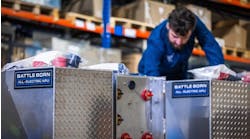Continued tight capacity in the truckload sector is leading several big-name carriers to shift their business strategies to provide more dedicated and intermodal services at the expense of their traditional medium- and long-haul freight.
“We saw a big increase in our dedicated miles last year, while our over-the-road solo driver miles declined significantly,” Max Fuller, co-chairman of Chattanooga, TN-based TL carrier U.S. Xpress Enterprises said during the company’s year-end conference call with analysts and reporters. “Our length of haul declined 8% and we’re now getting paid for deadhead miles – that’s a real significant change in our business.”
U.S. Xpress said that its dedicated business grew 92% last year, while intermodal soared 169% and expedited team service rose 30%. By contrast, its bedrock medium- and long-haul service declined 17%.
For 2004, U.S. Xpress said revenue increased 18.8% to $1.1 billion, with net income rising 115% to $16.4 million, compared to 2003. For the fourth quarter of 2004, the company’s revenue increased 30.4% to $312.3 million, while net income increased 134% to $6.2 million, compared to the same quarter in 2003.
Lowell, AR-based truckload conglomerate J.B. Hunt Transportation Services has also indicated the capacity pinch is making dedicated and intermodal business much more attractive than over-the-road freight.
“Net revenue for our dedicated division excluding fuel surcharges in the fourth quarter of 2004 was up 14.3% compared to same quarter in 2003 – an increase driven by growth of 9.5% in the average number of tractors assigned to this segment, a 4.4% improvement in productivity, and net revenue growth per loaded mile of 6.5%,” said Kirk Thompson, J.B. Hunt’s president & CEO. “Operating income was a record $23.7 million for the fourth quarter of 2004 compared to $14.8 million for fourth quarter 2003.”
For 2004, J.B. Hunt’s total revenue increased $400 million to $2.8 billion and net income more than doubled to $180 million for 2004.
Thompson added that intermodal revenue rose to $326 million in fourth quarter of 2004, driven by freight volume increase of 9.6% and an increase in revenue per loaded mile of 7.9% -- as well as surcharges imposed to cover the high cost of rail transportation.
“It has been a very challenging environment for our customers over the last year as demand has outstripped supply for much of the year,” Thompson noted. “Unfortunately, there appears to be no end in sight for the shortage of qualified drivers and supply is likely to remain constrained for some time.”
That’s one of many factors behind the explosion in trucking operating costs – one that is contributing to truckload carriers’ desire to be in higher-profit transportation niches.
U.S. Xpress, for example, said solo and team driver pay increased 17% in 2004 on a per-mile basis and co-chairman Fuller expects more pay raises – though on a smaller scale – will be needed in 2005 to keep turnover down. Insurance premiums went up 5.7% to 7% and 40% higher fuel prices combined with the lower fuel efficiency of EGR engines negatively impacted the carrier’s earnings.
“Our truckload operating results reflect the success of our strategy within our truckload segment of shifting assets to dedicated, regional, and expedited rail services that we believe offer the opportunity for higher and more consistent returns,” said Patrick Quinn, co-chairman of U.S. Xpress. “Our dedicated and expedited rail generally provide for higher rates relative to our over-the-road solo and team truckload operations.”
“Truckload capacity is going to continue to be constrained in 2005 and there is no foreseeable solution to the driver shortage,” he said. “Looking forward … within our truckload segment, we believe there continues to exist a significant opportunity to achieve substantial growth at desirable margins in our dedicated contract and expedited rail operations,” said Quinn.



